Mass Effect 2 - Overlord
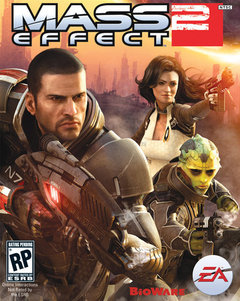 If there’s anything we’ve learned from science fiction, it is that artificial intelligence cannot be trusted. Isaac Asimov’s 1950 collection of short stories, I, Robot, was all about robots, A.I., and Asimov’s Three Laws of Robotics, which above all is about the protection of humans. 2001: A Space Odyssey famously featured the not-so-friendly HAL, and recent movies such as The Matrix and Moon both star some nasty A.I.s. In gaming history, GLaDOS and SHODAN are two of the medium’s most popular villains.
If there’s anything we’ve learned from science fiction, it is that artificial intelligence cannot be trusted. Isaac Asimov’s 1950 collection of short stories, I, Robot, was all about robots, A.I., and Asimov’s Three Laws of Robotics, which above all is about the protection of humans. 2001: A Space Odyssey famously featured the not-so-friendly HAL, and recent movies such as The Matrix and Moon both star some nasty A.I.s. In gaming history, GLaDOS and SHODAN are two of the medium’s most popular villains.
So it was only a matter of time before Mass Effect featured a big bad A.I. story, and that arrives in Overlord. It was the first paid Mass Effect 2 DLC that didn’t include a new character or weapon, so at 560 MS Points ($7), the story would have to be well worth it.
This isn’t Mass Effect’s first foray into evil A.I. with the Geth and Reapers featuring so prominent in the story along with the Rogue V.I. mission in the original, but this is its first take on the traditional human menace we all so know and love.
Bit.Trip Runner
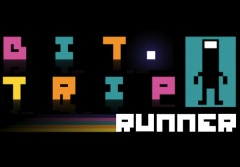 The era of digital distribution has been good to many smaller
developers. One needs to look no further than the Minecraft success story to see
just how fruitful the budget game market can be.
The era of digital distribution has been good to many smaller
developers. One needs to look no further than the Minecraft success story to see
just how fruitful the budget game market can be.
Even on Nintendo's meager WiiWare service, some have found the opportunity to shine. Gaijin Games, a small studio founded by a former LucasArts employee, has found acclaim with its Bit.Trip series. With six games in the series released within two years, each Bit.Trip title is built on the same foundation of rhythm and psychedelic retro aesthetics but offers a different gameplay hook. Beat, the first title, is like the love child of Pong and a laser show. Core is more like a tricky Guitar Hero with a D-pad. Void is an avoid-and-collect using the nunchuk's control stick. Fate is a rail shooter utilizing the Wii remote's pointer. And Flux, the final chapter in the Bit.Trip saga, returns to an experience similar to the choreographed Pong performance that birthed the series in Beat.
I recently acquired Bit.Trip Runner, the fourth game released (and the third I've played, after Void and Beat). It happens to be the one that generates the most buzz in the gaming community. Runner certainly sounded appealing to me when I was introduced to it as a "rhythm-based platformer." My experience with the game, however, came somewhat short of my high hopes.
Portal 2
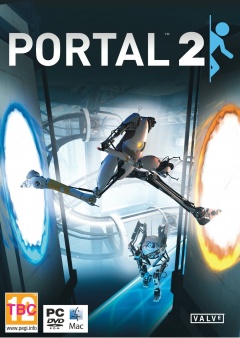 As the sequel to my 2007 Game of the Year, I had high expectations of Portal 2, and so did the developers Valve, and everyone else mildly interested in video games. This was a milestone release, and Valve has been rewarded with many accolades and undoubtedly excellent sales numbers. I was able to sit down with Portal 2 for Windows and beat it in three extended gaming sessions over a few weeks.
As the sequel to my 2007 Game of the Year, I had high expectations of Portal 2, and so did the developers Valve, and everyone else mildly interested in video games. This was a milestone release, and Valve has been rewarded with many accolades and undoubtedly excellent sales numbers. I was able to sit down with Portal 2 for Windows and beat it in three extended gaming sessions over a few weeks.
That last sentence might be rather revealing, yes, the game took me weeks to beat. I took on the original Portal in one sitting. Of course, Portal 2 is longer than the original, and I have two kids now instead of none, but I’ll say right off the bat I felt like some kind of spark was missing.
So let’s just dive right into my review of Portal 2. This review will probably be shorter than usual simply because of my personal pact to spend less time writing full reviews this year, so hopefully I can more succinctly say what needs to be said.
Diablo II - History and Gameplay
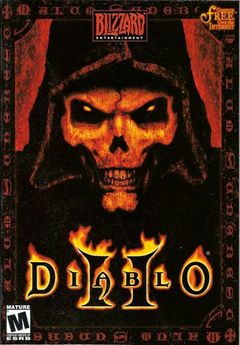 On November 30th, 1996 the world was rocked by the release of what is quite possibly the start of the isometric hack’n’slash genre: Diablo. It was renowned for its remarkably dark atmosphere, creative character customization, easy control scheme and extremely in-depth storytelling.
On November 30th, 1996 the world was rocked by the release of what is quite possibly the start of the isometric hack’n’slash genre: Diablo. It was renowned for its remarkably dark atmosphere, creative character customization, easy control scheme and extremely in-depth storytelling.
Not only did it have all of this, it also had online multiplayer via a free service called Battle.net that is also host to virtually all of Blizzard's games.
After a few years of garnering international success, it was announced that a sequel was in the works. Diablo II was released on June 29th, 2000. For me, educationally, it was all downhill from there.
This is part one of a multi-part review and historical remembrance of Diablo II. We also played the first hour of Diablo II a few years ago.
Mass Effect 2 - Firewalker Pack
 I’m about two-thirds done with my insanity playthrough in Mass Effect 2. Insanity is the hardest difficulty in the game and beating it will also unlock my final main game achievement. The only other game I earned all the achievements on? The original Mass Effect.
I’m about two-thirds done with my insanity playthrough in Mass Effect 2. Insanity is the hardest difficulty in the game and beating it will also unlock my final main game achievement. The only other game I earned all the achievements on? The original Mass Effect.
So on this run I’m also playing all the downloadable content I missed the first time through (mostly because it simply wasn’t available yet). So while I’ve reviewed Normandy Crash Site, Zaeed, and Kasumi add-ons earlier, I’m now venturing into Firewalker, Overlord, Shadow Broker, and Arrival territory. General reception of these has been a mixed bag, but I’m excited to form my own opinion.
So as you can tell, Firewalker is first up. This was Mass Effect 2’s first foray back into vehicles. Mass Effect 1 heavily featured the Warthog-like Mako and built dozens of multiple square mile planets to land on and explore. The Mako was probably one of the weaker aspects of the game, but I found it pretty fun when we weren’t required to climb up 80 degree angles.
I was pretty excited to try out the M-44 Hammerhead myself, let’s see how that turned out. The Firewalker Pack is free for members of the Cerberus Network, much like the character Zaeed and his loyalty mission.
I Didn't Beat This Game: Dragon Quest IX: Sentinels of the Starry Skies
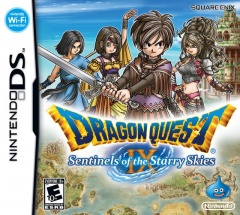 I knew full well going into Dragon Quest IX: Sentinels of the Starry Skies that it was going to be a long game. Its pedigree was more than enough, I had friends who had played the previous entries for hundreds of hours, and the series is known for essentially being the Japanese RPG.
I knew full well going into Dragon Quest IX: Sentinels of the Starry Skies that it was going to be a long game. Its pedigree was more than enough, I had friends who had played the previous entries for hundreds of hours, and the series is known for essentially being the Japanese RPG.
But Dragon Quest IX had quickly gained the reputation of being the Nintendo DS RPG, so I wasn’t going to miss out on this event. I plugged away at the game for hours, over 30 in total, but then I stopped. I turned it off one day last August and that was it. I tried getting back into the game a few times, but each time I died quickly or was completely lost on where to go next.
It’s almost a little disappointing to me that I don’t really have a good immediate reason on why I quit, but maybe I can tease something out of myself with a little mind dumping.
L.A. Noire - Video
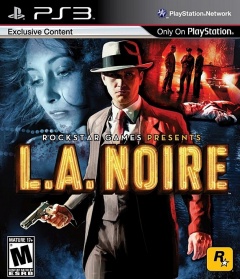 I like to think I'm open-minded, but it's undeniable that I'm leery of
open-world games. The genre's tendency to prioritize quantity over
quality often produces sandboxes full of activities and environments
that are rough around the edges (if not outright broken). That's not to
say that the entire package can't overcome the inadequacy of its
individual elements, but the apparent lack of focus often leads me to suspect that developers sometimes take the kitchen-sink route to distract
players from a game's inability to evolve, improve, or even replicate
proven game mechanics.
I like to think I'm open-minded, but it's undeniable that I'm leery of
open-world games. The genre's tendency to prioritize quantity over
quality often produces sandboxes full of activities and environments
that are rough around the edges (if not outright broken). That's not to
say that the entire package can't overcome the inadequacy of its
individual elements, but the apparent lack of focus often leads me to suspect that developers sometimes take the kitchen-sink route to distract
players from a game's inability to evolve, improve, or even replicate
proven game mechanics.
It's this perceived deficiency, whether imagined or real, that has distanced me from THE sandbox developer's games. I had a decent time ramming criminals off the road in Grand Theft Auto III's vigilante missions, and Red Dead Redemption's gorgeous frontier can be fun to gallop through, but I've mostly ignored Rockstar's standard-setting sandboxes. While Web of Shadows and InFamous at least throw some fancy superpowers into the mix, there's not a whole lot more to Grand Theft Auto and Red Dead Redemption than driving and shooting, one or both of which are available (and often superior) in a thousand other games.
So it certainly was a surprise for me when I caught my first trailer for L.A. Noire -- a project that Rockstar has been cooking up for many years now -- and saw a concept that appears not only focused, but novel and ambitious as well. The game's use of facial capture animation produces some of the most realistic character visuals the medium has ever seen, and the trailers would have you believe that it's not just for show: players will have to intuit characters' body language and act on hunches in order to get to the bottom of each case. The feeling I'm getting is less Grand Theft Maltese Falcon and more Phoenix Wright: Cynical Detective. I'm skeptical that it will quite live up to what I have in mind, but I'm more than willing to let it try.
The following video is a taste of L.A. Noire's third case, which should give you an idea of a detective's duty and how to do it with all the bumbling inadequacy of Inspector Jacques Clouseau.
Mass Effect: Genesis
 When Mass Effect 2 was announced for release on the PlayStation 3, there were a lot of questions about how it would work since Mass Effect 1 had only been released on the Xbox 360 and Windows. Not only was Mass Effect 2 the direct sequel to one of the most expansive narratives ever seen in a video game, but the game imported the first title’s saved games to keep the player’s choices intact throughout the series. How would the developers handle the complete lack of Mass Effect 1? The answer: Mass Effect: Genesis.
When Mass Effect 2 was announced for release on the PlayStation 3, there were a lot of questions about how it would work since Mass Effect 1 had only been released on the Xbox 360 and Windows. Not only was Mass Effect 2 the direct sequel to one of the most expansive narratives ever seen in a video game, but the game imported the first title’s saved games to keep the player’s choices intact throughout the series. How would the developers handle the complete lack of Mass Effect 1? The answer: Mass Effect: Genesis.
For gamers that didn’t have a Mass Effect 1 save to import, BioWare had selected a set of “canon” choices to at least lay down the groundwork. The default choices generally meant that players would miss out on some interesting characters, including Wrex, a fan favorite. For Xbox 360 and Windows players, they could play 30+ hours of Mass Effect to generate their ideal saved game, but with Genesis, PS3 owners could play the 15 minute interactive comic and make a few key decisions.
Yesterday, Mass Effect: Genesis was surprisingly made available on the Xbox 360 for 320 MS Points, here is my take on it.
Crysis 2 - Video
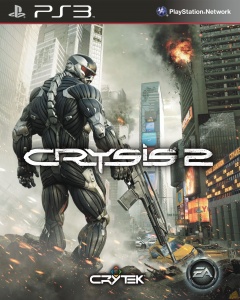 PC game development is hard. Unlike consoles and their mass-manufactured conformity, every
PC has a different set of guts, so there comes a time when the
development team needs to test their code through dozens of Frankenstein
computer setups to make sure the game actually works on an acceptable
percentage of PCs on the market.
PC game development is hard. Unlike consoles and their mass-manufactured conformity, every
PC has a different set of guts, so there comes a time when the
development team needs to test their code through dozens of Frankenstein
computer setups to make sure the game actually works on an acceptable
percentage of PCs on the market.
Crytek had a fairly genius solution to this annoyance: they made a game that no computer assembled in the present day would be powerful enough to process, and figured that the future would solve their problems for them. It was called Crysis; Crytek's prophecy was fulfilled when NASA aborted the space program in order to refocus its priorities towards creating a machine capable of playing this game [citation needed].
For whatever reason, Crytek abandoned this strategy with the game's sequel. Crysis 2 was created to be played not only on PCs assembled on Earth and before the year 2018, but on current consoles as well. I played a bit of Crysis 2 and got a sense of what the distant future will be like when consumer machinery finally catches up to the original Crysis' requirements.
I recorded the first hour of the game in glorious 480p and trimmed the downscaled footage to give you a taste of the game's opening sixty. A busted monument, superpower lessons, robot spiders, and choke-slams await.
Portal 2
 It has been a pretty good year of gaming for me in 2011, with Ghost Trick: Phantom Detective and Radiant Historia sending out the original Nintendo DS in proper fashion, but even more exciting is one of the biggest games of the year, Portal 2.
It has been a pretty good year of gaming for me in 2011, with Ghost Trick: Phantom Detective and Radiant Historia sending out the original Nintendo DS in proper fashion, but even more exciting is one of the biggest games of the year, Portal 2.
It’s fun to look back at where the Portal “series” began: as a humble bonus in The Orange Box which featured big names like Half-Life 2: Episode 2 and Team Fortress 2. Portal was essentially created by a couple of DigiPen grads and Valve molded that into one of the biggest gaming surprises... ever. It was my 2007 Game of the Year and I wasn’t the only one to hand it such an award.
Portal 2 was released last month, but instead of riding the coattails of something like Half-Life 2: Episode 3, it comes out as a full, stand-alone game. It probably doesn’t need to be said that it is receiving beyond excellent reviews, but before we venture too deep down the portal hole, let’s visit its first hour.
